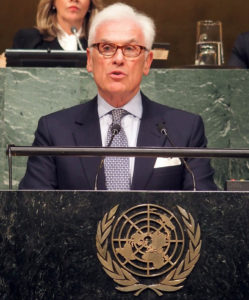
Stakeholders map the Internet’s future and endorse progress made
The International Chamber of Commerce (ICC) Business Action to Support the Information Society (BASIS) applauds the decision that endorses the global multistakeholder community’s collective management of the Internet.

ICC BASIS has applauded yesterday’s agreement at the United Nations’ 10 Year Review of the World Summit on the Information Society (WSIS +10) High-Level Meeting that endorses the global multistakeholder community’s collective management of the Internet and extends the mandate of the Internet Governance Forum (IGF) for another 10 years as a global platform for multistakeholder discussion of Internet public policy issues.
This recognition of the value of multistakeholder collaboration and engagement underlines the significant contributions of the private sector in cooperation with governments, technical community and civil society as fundamental to further development of the information society and advancements of the recently adopted 2030 UN Sustainable Development Goals (SDGs).
During the two-day meeting in New York, where government ministers and officials from more than 190 countries convened to adopt the WSIS+10 Outcome Document, ICC Secretary General John Danilovich took to the podium of the General Assembly. He highlighted the outcome’s recognition of the important private sector investment and innovation at the forefront of the remarkable advancements of the information society over the past 10 years and as essential for bridging persistent digital divides and realizing the SDGs.
“The private sector has played and will continue to play a crucial role in unleashing the potential of ICTs in advancing the development of the Information Society globally and moving society towards the Sustainable Development Goals. It is committed to engaging with other stakeholders to address the challenges raised in the Outcome document and remains deeply engaged in capacity building strategies that leverage the power of ICTs for economic prosperity,” he said.
The private sector has played and will continue to play a crucial role in unleashing the potential of ICTs in advancing the development of the Information Society globally and moving society towards the Sustainable Development Goals.
Advocating for an open, secure, reliable, interoperable and inclusive global Internet on behalf of small, medium, large and multinational enterprises in every sector and part of the world, ICC BASIS believes that governments must seek to better understand barriers to Internet access and use through increased collaboration and partnerships with non-governmental stakeholders to more fully integrate their activities within development frameworks and processes, while fully respecting and upholding all human rights.
On behalf of 6.5 million companies and associations in over 130 countries, Mr Danilovich said: “If we are to maximize the potential of ICTs to promote sustainable and inclusive development, it is crucial that the future of the Internet is shaped through an open, inclusive and truly multistakeholder process.”
“Connecting the world is a vital first step but we also need to take common action to build a secure and trustworthy Internet,” he added. “And we encourage governments to note the growing number of multistakeholder initiatives dedicated to cybersecurity capacity building at the local, national, regional, and global level and their significant potential to enable a new global culture of cybersecurity.”
The United Nations General Assembly (UNGA) has been reviewing the progress made in achieving the goals set out 10 years ago at the World Summit on the Information Society (WSIS) meeting in Tunis, which set targets for the international community to ensure an inclusive information society. Presented today, the agreed outcome document, a text that has received input from governments, civil society, the technical community, the private sector, including ICC BASIS, and other relevant stakeholders, will influence how the Internet is governed for the next decade, as well as how the Internet and ICT will continue as a vehicle of sustainable development and means of growth for the global economy.
ICC BASIS welcomes the extended mandate of the IGF – the annual multistakeholder-led gathering, which business believes remains crucial to expanding the world’s Internet knowledge agenda.
While congratulating the UNGA presidency for engaging stakeholders in the process and commending the co-facilitators on their inclusive navigation of the outcome document drafting process – ICC BASIS urges governments to further recognize engagement of non-governmental stakeholders as essential to bridging digital divides. It also calls for multistakeholder cooperation and full inclusion to be the basis of all activities which may arise as a result of WSIS reviews and any future reviews, aligned with the sustainable development goals agenda review. This collaboration is essential to addressing the challenges and realizing the potential outlined.
For more information
The speech of ICC Secretary General John Danilovich at World Summit on the information Society +10 Review can be found here.
More information on the UNGA WSIS+10 review can be found here
WSIS+10 agreed outcome document can be found here
ICC SG @JohnDanilovich will chair #WSIS10 multistakeholder discussion: Digit Econ & Sust Dev https://t.co/mOhyIrDQ8f pic.twitter.com/paPwqOf9mY
— ICC NetGov (@ICCnetgov) 15 décembre 2015

